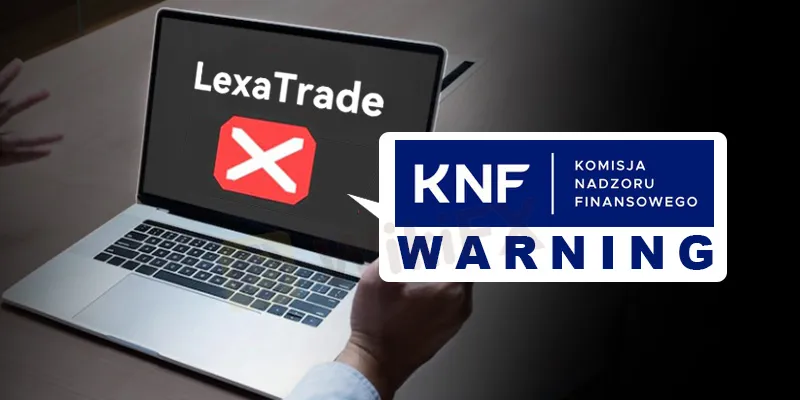简体中文
繁體中文
English
Pусский
日本語
ภาษาไทย
Tiếng Việt
Bahasa Indonesia
Español
हिन्दी
Filippiiniläinen
Français
Deutsch
Português
Türkçe
한국어
العربية
Scam Alert: Polish KNF Issues Warning Against LexaTrade
Abstract:Since the forex market is overly populated with good and lousy forex brokers, it becomes essential for investors to remain extra vigilant when making a choice.

No matter how well you know the market, shabby brokers like LexaTrade can have various tactics to make you believe them to be a legitimate company.
Overview
LexaTrade is a brand name of Swissone Group Ltd based in St. Vincent and Grenadines. The company claims to have been regulated by International Financial Market Relations Regulation Centre (IFMRRC) under license number RU 0395 AA V0189. The broker provides trading services across multiple asset classes, including forex, shares, indices, and commodities. Besides offering lucrative bonus offers, the company entices clients with insurance protection on deposits of up to 5000 U.S Dollars.
Regulatory Status
LexaTrade is a non-regulated brokerage firm. Being an unregulated entity, it is not safe for trading. That means funds deposited with the company don't have legal protection if the company becomes bankrupt.
Clientele Feedback
LexaTrade is one of the poorly rated brokers available around. While the company's existing clients provide negative feedback for its malpractices, its formal customers do not have different opinions either. Ranging from withdrawal issues to trade execution and customer support, the company always make people suffer. Let us share some screenshots as a piece of evidence.

What Makes LexaTrade A Scam Setup?
First, the company is headquartered on an offshore island, with no legal supervisory authority except for the SVGFSA to oversee financial intermediaries. However, the SVGFSA neither regulates nor issues licenses to brokers dealing in forex and binary options trading. Instead, it only registers non-forex companies operating within St. Vincent and Grenadines.
Second, the company claims to be holding regulations from the IFMRRC, which itself is a non-governmental self-regulatory organization with no track record of being endorsed by any reputable regulatory authority.
Further, the company has been denounced in various jurisdictions by concerned supervisory authorities like Polish Financial Supervision Authority (KNF). According to KNF, the broker is not registered in Poland. It further states that clients should avoid trading with LexaTrade since it operates without the required permission.

How LexaTrade Trap Clients?
LexaTrade customer service agents keep pushing clients via phone calls and emails, asking them to fund their accounts. However, they become less concerned after receiving funds from clients and don't even bother to respond to your concerns and queries. Their only motive is to steal investors money by any means.

What to do If I've deposited my funds with LexaTrade?
Unfortunately, there isn't much you can do. Nevertheless, consider placing a withdrawal request with your broker immediately. There is no point in continuing trading with a company known to be ditching clients repeatedly. Essentially, it hurts you more when you aren't able even to file a case against it.
Bottom line
LexaTrade and other brokers alike disguise clients through different methods. For instance, a broker might pretend to have been licensed when it is not, or it might lure you into trading by making false promises. Profitable forex trading involves profound market knowledge and expertise you can't learn overnight. Therefore, do not pay any heed to brokers promising unrealistic returns. Further, always confirm a broker's regulation from the respective regulatory authority before signing up. Preferably, you broker should hold regulations from a prestigious regulatory organization.

Disclaimer:
The views in this article only represent the author's personal views, and do not constitute investment advice on this platform. This platform does not guarantee the accuracy, completeness and timeliness of the information in the article, and will not be liable for any loss caused by the use of or reliance on the information in the article.
Read more

Hantec Markets Partners with Fortaleza EC, Strengthening Its Connection with Brazil’s Football Commu
In a landmark move, global trading broker Hantec Markets has become the official trading partner of Fortaleza EC—one of Brazil’s most beloved and historic football clubs. This partnership underscores Hantec Markets’ commitment to aligning with premier sports organizations that share the company’s values of ambition, determination, and excellence.

Trump vs. Powell: The Showdown That Will Shape Global Markets
The financial market is in a downturn, with Trump and the Federal Reserve each making their own calculations, while investors anxiously watch from the sidelines. Their decisions will determine the market’s direction!

U.S.-EU Trade War Escalates: What Should Investors Do?
The U.S.-EU trade war has officially begun, with escalating tariffs shaking the markets. Investors face significant challenges—how can they find opportunities amid the turmoil?

Best Binary Options Indicators: Enhance Your Trading Strategy
Binary options trading involves predicting whether an asset's price will rise or fall within a specific timeframe. Unlike traditional investing, more specifically, binary options demand rapid decisions due to fixed expiry times (e.g., 60 seconds to 1 hour). For instance, speculating if EUR/USD will be above 1.0800 in the next five minutes. Success yields a fixed payout, while failure results in the loss of invested capital. Binary indicators distill complex market data—price action, volume, volatility—into actionable signals tailored for short-term trades. Indicators act as a compass, guiding traders to trends, reversals, and optimal entry points, thus enabling traders to detect market shifts for higher-probability decisions.
WikiFX Broker
Latest News
Indian Watchdog Approves Coinbase Registration in India
SILEGX: Is This a New Scammer on the Block?
IIFL Capital Faces SEBI's Regulatory Warning
How Can Fintech Help You Make Money?
Why Is OKX Crypto Exchange Under EU Probe After Bybit $1.5B Heist?
Gold Trading Insights: Prepare for Moves Above $2,900 Post-CPI
Good News for Nigeria's Stock Market: Big Gains for Investors!
Royal Forex’s CySEC License Revoked: Can It Still Operate Legally?
The ‘Boom-S’ Scam: How a Simple Click Led to RM46,534 in Losses
Trump vs. Powell: The Showdown That Will Shape Global Markets
Currency Calculator






